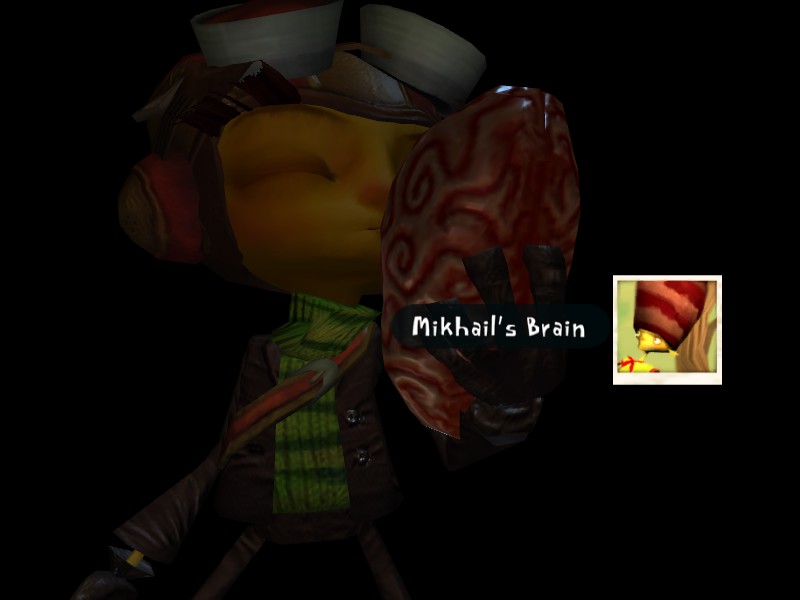Looking for the Quick Review?
Psychonauts made me question my reliability as a reviewer. Having completed the game and given myself enough time to digest it, I’m ready to write about a very well-written and entertaining game. But I almost didn’t complete it. And in the half-hour or so I spent hammering away at one dreadfully frustrating platforming section, I swore the developers would hear my wrath (if they ever accidentally stumbled on this page Googling for something else).
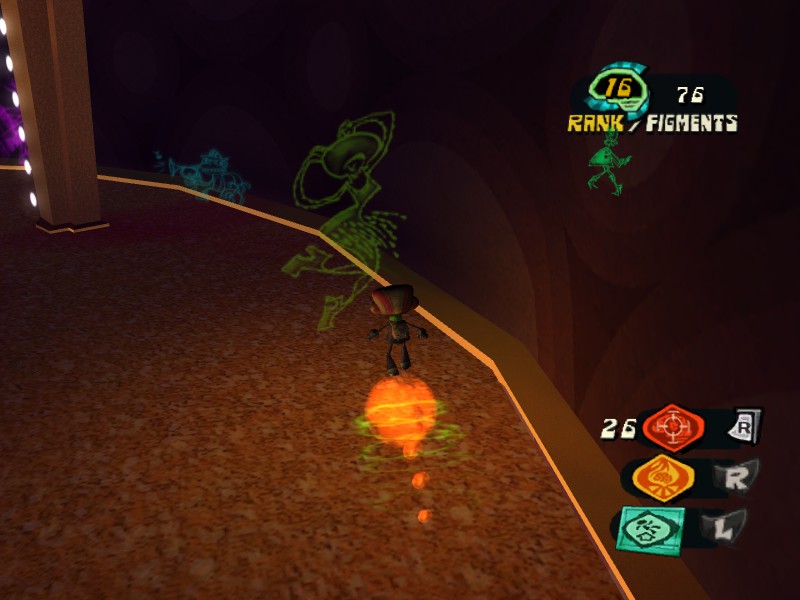
Maybe I’m being too hard on myself. The best of us have felt the urge to throw a controller in rage. Some of us (lunatics) consider the ability to conjure that feeling a hallmark of a good game. I’m sure I would have calmed down over time, enough to acknowledge the game’s strengths in spite of its weaknesses, but I don’t like reviewing games I haven’t completed. It felt like a cop-out with Morrowind, and those familiar feelings rose again here.
I’m glad I did finish Psychonauts, because a bitter taste at the end would have bookended what I otherwise found to be a pleasant game with feelings of overwrought negativity. I’ve found in recent years that I’m something of an aesthetic asshole, and my skepticism with this game’s art style kept me from diving in for a long time. This is obviously so “your mileage may vary” it hurts; this series’s aesthetic has been widely-lauded; it’s won awards. But I found promotional material too reminiscent of the gross-out boogercore cartoons of the late nineties and early two thousands. Actually playing the game, I never found myself espousing the same love other reviewers have, but I wasn’t revolted either. The art and I became familiar, if not friendly.
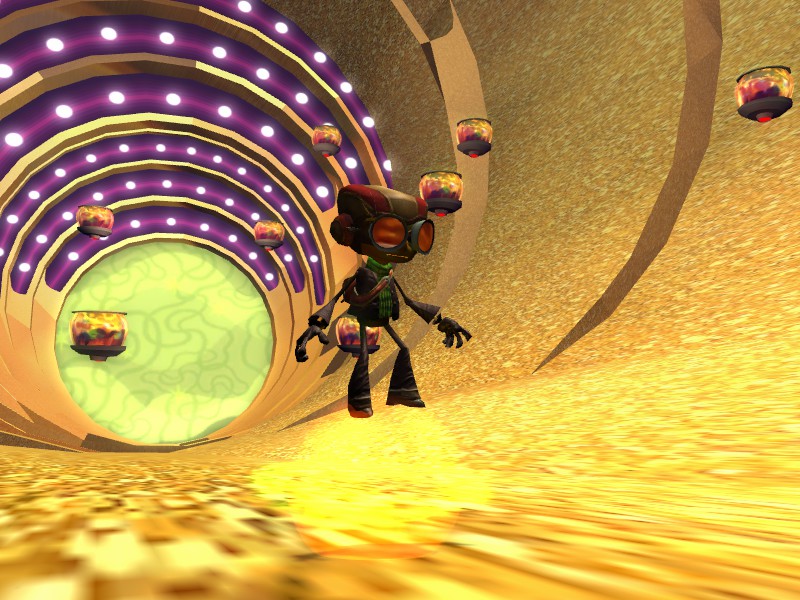
Psychonauts flies by the strength of its writing. This is a game of the GameCube era (though, surprisingly, it never actually released on that console), so that its punch lines were as unexpected and genuinely funny as I found them is something to be proud of. Characters aren’t necessarily deep — very few of them are on-screen long enough for that kind of development. But Psychonauts makes the most of this brevity, building a game where every exchange is meaningful and worthwhile.
For all that the quality of its comedy caught me off guard, I had expected Psychonauts to go for humor. That was its obvious niche. What I’d expected less were its surprisingly-effective dramatic undertones and themes of psychological trauma and recovery. To be clear, Psychonauts is, at its core and throughout, a comedy; there’s no existential truth or psycho-nightmare at the center. But the game isn’t afraid to delve into the minds of these colorful characters, to give them hopes and fears that play out in the battlefields of their subconsciouses. At times, it’s close to profound.
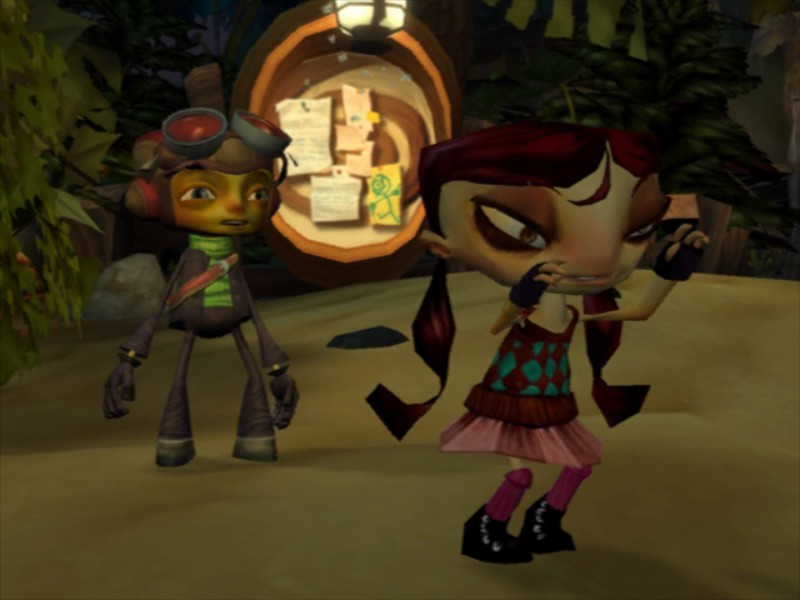
We play as Raz, an ambitious 10-year-old gate crasher at an elite summer camp for psychically-gifted youths. Our goal is to become a Psychonaut, a psychic agent-explorer tasked with carrying out missions of mental reconnaissance. Once inducted into the training program, our training regimen involves entering the minds of those around you via a handy front door you slap onto their foreheads. Behold: a direct path to the human subconscious.
Each brain is its own unique world and comes with its own set of challenges. This is the bulk of Psychonauts‘s gameplay and where its platforming and story both shine. Entering a character’s psyche for the first time is an exciting experience that challenged my ability to expect the unexpected, passing me from an active battlefield strewn with meat to a paranoid, Escherian suburbia before dropping me into a neighborhood of Spanish dog-artists terrorized by the nonstop running of a local bull. It’s easy for a platformer to get away with slow iterations covered mostly by set changes. Psychonauts steers clear of that path. As a result, each level feels as it’s meant to, the unique creation of a new character’s subconscious, fit with localized insecurities and bespoke trauma.
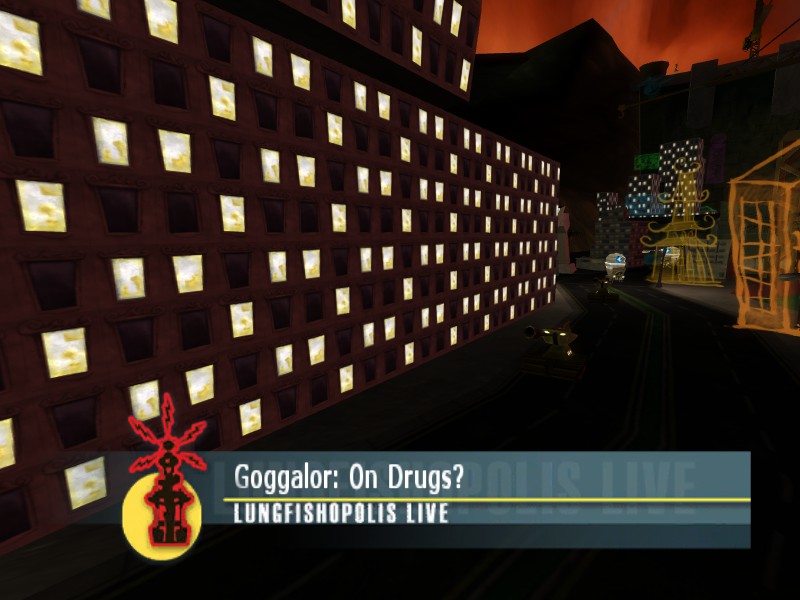
For all its strengths, this is a decade-and-a-half-old game, and it’s worth talking about the parts where the paint has chipped a little over the ensuing 15 years. First, the platforming: it’s not bad, but I found it to be a little inconsistent. Most of my navigational difficulties came from the game’s poorly-clarified structures, climbable surfaces that don’t look climbable, slidable surfaces that don’t look slidable, and textures that seem to imply climbability and slidability only to incur disappointment. These inconsistencies are few and far between, but still frequent enough to have made an impression. It’s kind of a bummer to spend ten minutes trying to parkour my way up a tower only to find out I could’ve been climbing the wall the whole time.
I opened this review recounting a frustration so far uncharacteristic of the game I’ve been describing. Most of Psychonauts is well-designed, well-telegraphed, and new player-friendly. I felt challenged, as an absolute platforming amateur, but frustration was rare. Then came the game’s final level. Only once before it had a level brought my toes in line with the frustration barrier, the point at which a game’s capacity to enrage challenges its ability to entertain and relax. To my fortune, the duress foisted upon me by the Napoleon level was relatively brief. I can’t say the same about the game’s ending. I don’t know how many hours I spent in that last brain. At one point, I’m sure I slap-welded a door onto my own cerebrum, taking a break from the level to deal with the trauma it had caused me.
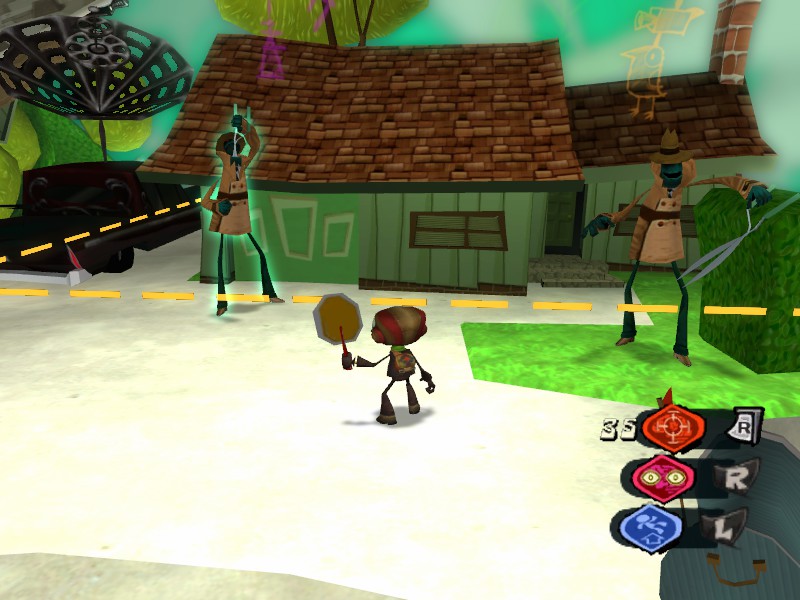
I’m embellishing. I’m well aware that this is the point of the review where I lose the platforming pros. Those baptised in the crucible of Super Meat Boy will, understandably, be liable to question why I’m struggling to lift myself from laying face-down in the kiddy pool. But for my imagined audience, gamers somehow more casual than I, the climb in platforming difficulty this last level presents is so ridiculously high and so unbecoming of the rest of the game that it’d be misleading for even the most seasoned platformer to call it fair. Dark Souls doesn’t mislead you. It tells you the kind of game it’s going to be immediately. For the most part, Psychonauts does too: it’s challenging, but it’s not jar-your-own-brain challenging. But then this level arrives to upend all of that. The jumps become unreliable, the save points unforgiving. Another half hour and I’d have been fully convinced that the aim of the game was to lure players into a false sense of security and then drive them mad through this sudden synaptic scrambling.
Perhaps even more than its platforming, Psychonauts’s combat bears the burden of its age. What passed (and may have even excelled) as platformer combat in 2005 is a harder sell now. There’s none of the rage that comes with the harder platforming bits, and boss fights are easily navigable for anyone who can stomach a little trial and error. But the combat isn’t really fun at its best, and starts feeling tedious at its worst. Enemies serve only to gate and slow the superior puzzles and platforming, and their scaling feels off; intelligent, humanoid enemies have nothing on the destructive power of the rats that appear later on.
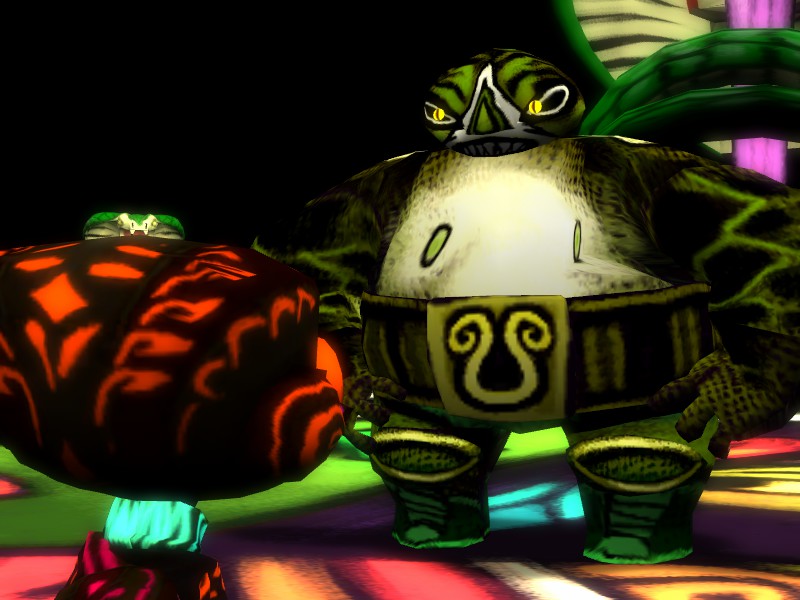
Finally, Psychonauts came out at the tail end of the games industry’s decades-long struggle with camera clarity. It wasn’t until twin-stick controllers became ubiquitous that the idea of full camera control followed suit. Psychonauts is far, far, far from the worst offender where crimes against vision are concerned, but there were more than a few moments when I felt quirky camera placement put a damper on whatever platform maneuvering I’d been working on.
Ultimately, I enjoyed my time with Psychonauts. Whispering Rock Psychic Summer Camp and its personnel are captivating, and I’m confident that there’s no other game out there quite like this. Maybe Psychonauts 2. I haven’t played that one yet.
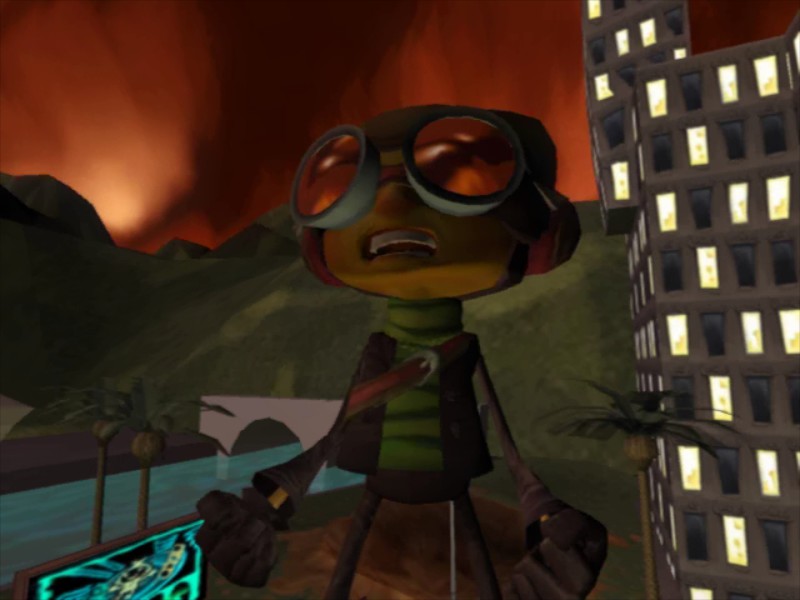
Quick Review
Game: Psychonauts
Developer: Double Fine Productions
Published by: Majesco Entertainment
Available for: Windows PC, Mac OS X, Linux, Playstation 2, Xbox
CONTENT
Microtransactions: None
Tedium: Very little mandatory — hunting for in-game currency and collectibles will allow you to acquire and upgrade gear quicker, but the necessary grinding is extremely minimal.
Violence: Cartoon
Content: Minor language, icky bad guys
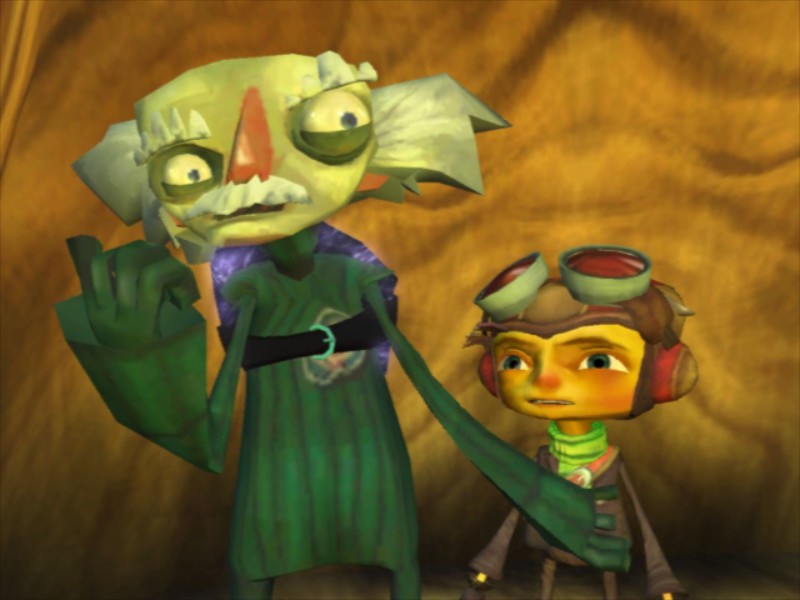
FEATURES
- Platforming
- Funny, light-hearted story with some deeper psychological themes
- Boss Battles
- Light combat
WHAT I LIKED
- Excellent writing — Psychonauts’s dialogue and punch lines hold up really well for a 17-year-old game.
- Unique world design — Each new level embodies a tone and aesthetic shift appropriate to the person psychologically projecting it. The art for each is stellar, but the game does an excellent job of making every level feel unique and inviting.
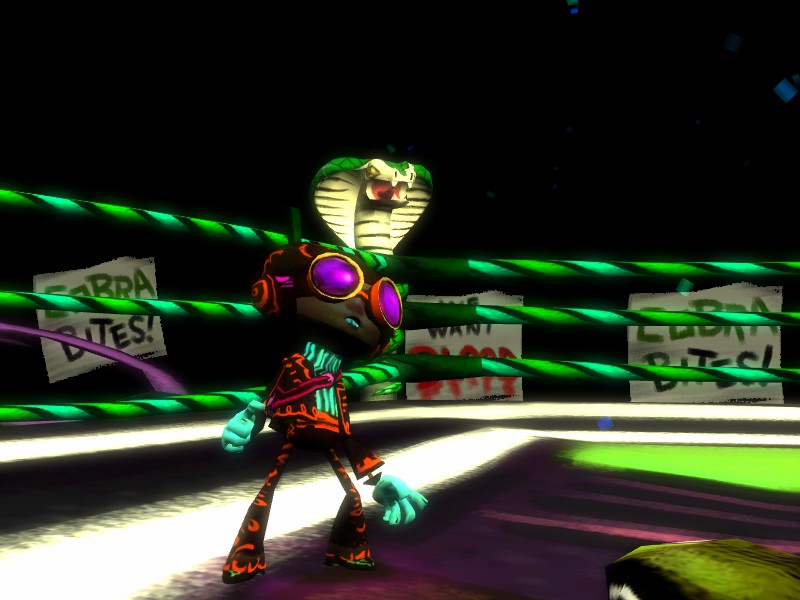
CONCERNS
- Some weak platforming — For a platformer, platforming isn’t Psychonauts‘s strong suit. It’s probably not bad enough to detract significantly from your enjoyment of the game, but platformer fans will be disappointed.
- Lackluster combat — It’s not frustrating. It’s not even poorly-programmed. It’s just a little repetitive and not particularly interesting.
- Big difficulty spike — Psychonauts, for the most part, is not a particularly difficult game. Until we reach the last level. Then it’s hell. If you’re good at video games, you’ll be able to shrug this off. The rest of us should prepare for some last-minute frustration.
WHO’S IT FOR?
If you’re interested in a quirky platformer-adventure game whose strengths lie in its world and story, the often-cheap (and on Game Pass) Psychonauts is a good bet.
If you’re a diehard, story-averse Platformer fan accustomed to the more refined releases of the last decade, this one might not be for you.
